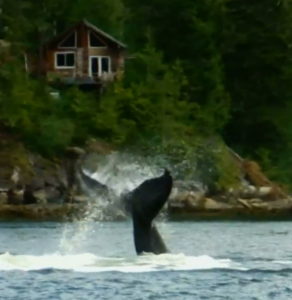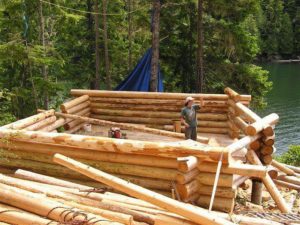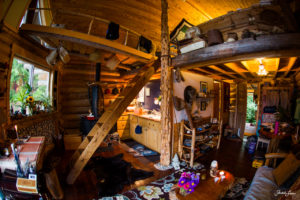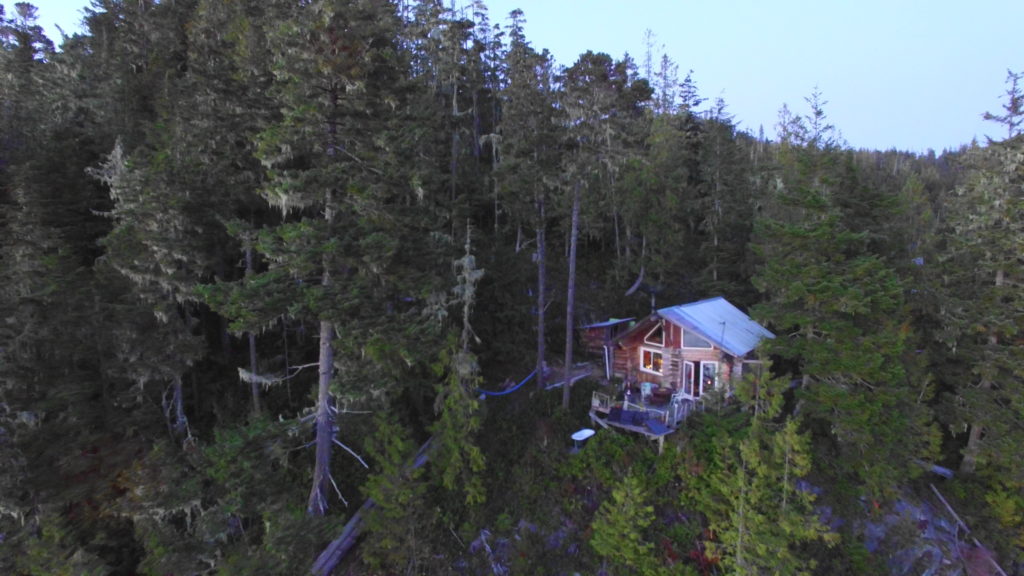The Truth about Off-the-Grid Living
I’m a forest dweller. I am blessed to live in an idyllic log cabin on an island in the wilderness. A row of solar panels line the front porch, black hose snakes along the hill carrying water from a distant creek, while a welcoming trail of smoke billows from the stove pipe. I’m perched atop a cliff surrounded by scented cedar trees and hemlocks draped in long flowing strands of yellow hued lichen. Bald eagles come to my call for fish scraps, I feel their whoosh of wings on my face as their outstretched claws snatch the salmon carcass beside me – nothing goes to waste.

The misty breath of humpback whales and white-sided dolphins send me dashing to my porch, Egglatina, my barred rock chicken comes running from the berry garden when I walk by, like Pavlov’s dog, hoping for the compost or treats from the veggie garden, while at night my neighbor flying squirrel, Babaji, glides down to my windowsill and ventures in my home looking for his usual late-night buffet. Oh, it sounds awesome all right, but believe me, you have to be a little bit moon-mad to want to live here. The truth is, living in the wilderness – Sucks! A lot of the time.
I live in the coastal community of Echo Bay. Population 9 and dwindling. It’s situated in a maze of forested islands off the east coast of Vancouver Island in B.C. Old timers knew it as The Mainland, before tourism chartered its way out here and labeled the area as The Broughton Archipelago.
I love living this wild life, most of the time, but I didn’t always. I grew up as a fashionable, privileged city girl, show jumping horses and eventually living the American dream life. It wasn’t until Nature began showing me the real magic and mystery of the natural world that I became curious of the green world. Hearing whispering trees, spinning stinging nettle rope, touching deer and cuddling a cougar quickly compelled me to seek the heart and truth of the wilderness.
I ventured out to the Mainland 12 years ago, to survive off the land and sea with primitive tools and technology. In my book, Becoming Wild, I wrote, “I abandoned a life of pedicured toes, Thai restaurants and diamond rings for dirty nails, roasted mice, and bear-claw necklaces. I rubbed sticks together to create fire, hunted game, harvested wild salads, and cured injuries with plants.” I tested my abilities beyond what I believed I was capable of, mastered the primitive skills in a world of depleting resources, reawakened lost senses and intuitive abilities and rediscovered the truths of our universe. I survived and thrived for 18 months.
As if touched by an angel, my whole being was transformed by the experience. I became wild, in the purest sense of the word.
When I returned to the city, I found it extremely difficult to adapt my wild ways to the fast-paced world, my senses were overloaded, my system overwhelmed. Worse, I couldn’t find my bliss anymore. I began grasping for the freedom I once enjoyed. I ran back to the wilderness. A part of me needs a wild place to call home now.
I followed a new dream: to build a “get-away” log cabin. My off-grid home is beyond my original vision and I miraculously built it mostly myself from a how-to book, a couple of YouTube videos and the miscalculated, start-up philosophy of “How hard could it be?” My estimated 6 month plan took 3 ½ years. 
Every off-gridder, homesteader, primitive survivalist, hippie, apocalyptic prepper and privileged urbanite, seeking a self-sustaining and self-reliant lifestyle has a unique meaning for living off-the-grid, but each expression has a fundamental, underlining principle; freedom. Living off-the-grid is a step of hope towards this quest for freedom.
For me, this lifestyle gives me a sense of freedom to do and be all of who I am. It nourishes my body, recharges my energy, speaks to my spirit and fills me with a true-hearted joy and ecstasy for life. Like primitive survival, becoming an off-gridder instills the knowing that you can do and become anything you need. Building my log cabin required a whole new set of modern skills I never thought I would need or care to learn. I’m now a log salvager, carpenter, mechanic, plumber, electrician, furniture maker, welder, organic farmer, commercial fisherman, youtube channel vlogger and internet repair woman.
I’m not unplugged. I know what it is to feel utterly disconnected with the modern world and it was the one thing that nearly drove me home from my survival trek. I also have experienced the lure of technology and niceties while building my cabin. I monitor the slippery slope carefully. When you’ve lived with nothing and felt you had everything, it takes some convincing to add a new bill to my life. I want to share, learn and give back to this world. Disappearing from the grid in the hopes of not being a part of it all is just an illusion. I am a part of everything just by being alive.
Living wild not only continues to strengthen my intimate connection with the natural world, but it also fuels me with the power, knowing and bold courage I need to step out into the technological world.
Living off the grid is also a huge inconvenience with an endless barrage of mayhem, madness and misery. We have two unique terms known in Echo Bay:
- Haywire – the state of a finished repair or construction project that has been engineered with ingenuity do to the parts or materials available, which always causes trouble later.
- The Fahrenheit Effect – All projects or repairs no matter how modest or minor are repeatedly frustrated by unpredictable random and bizarre events and parallel the temperature conversion formula F=9/5(C+32), where C is equal to the amount of time, energy and money that would ordinarily be expected for the task and F is equal to what it takes us in Echo Bay. We always double it and add 30. It’s only when you’ve accumulated enough tools and parts to classify yourself as a wilderness superstore that you can calmly overcome the sudden cupboard door falling off, frozen water line disaster or showerhead that one day decides to spurts out only a few lines of water.
I’m often seen as the pretty girl lost in the baggy, battery acid holey jeans and tattered Life is Good baseball cap, protecting my long hair from the realistic short hairstyle I should probably adopt, cursing, sweating, bleeding and flinging my face and greasy hands to the sky, sighing, “Why am I living like this?” And then, I follow the order of survival; I take a deep breath and laugh. Deep down I know I love the sacrifice, hassles and hard labor of this chosen lifestyle because immersed in it all, I feel truly alive.

I don’t cook on a woodstove or generate hot water from copper tubing wrapped around my stove pipe because I believe it is a sustainable way of life or a means of saving our earth. Becoming wild is not about returning to the old ways. For me, it’s about merging the best of our new technologies with the spirit of ancient wisdom. This back to the lander lifestyle trend is just another external attempt at curing what is an internal dis-ease of humanity. We need to live from our hearts not from our minds. When we soulfully connect with the purity and perfection of the natural world, we mysteriously see our own darkness reflected back. Living wild helps me become a better person and illuminates my true source of power within.
Society needs a new paradigm of thought to follow in order to bring light upon our planet. I believe the best way to raise human consciousness is by opening our wild hearts, choosing love over fear, faith over worry and cooperation over competition. Whether pampered in the city or unplugged off the grid, by living an authentic life with truth and integrity we become powerful catalysts for deep, lasting internal change, unconsciously giving permission for others to do the same. You don’t need to live 30 miles away from the nearest hardware store or hooked up to hydropower, to become wild and think miraculously.
I have finally found my balance between the sunken-cheeked survival world of Darwinian thought, emphasising domination and competition and our modern industrial landscapes of often empty decadence or fear-based feelings of lack and limitation. This balance brings me back to the primal, divine roots of humanity, that of unity consciousness, non-judgmental attitudes and feelings of compassion, vulnerability and thankfulness. Becoming wild made me a fearless woman.
To watch the madness of what I’m talking about, check out my video: https://www.youtube.com/watch?v=RHr99HqM12c
This was an article I wrote for Wild Woman Magazine


2 Comments